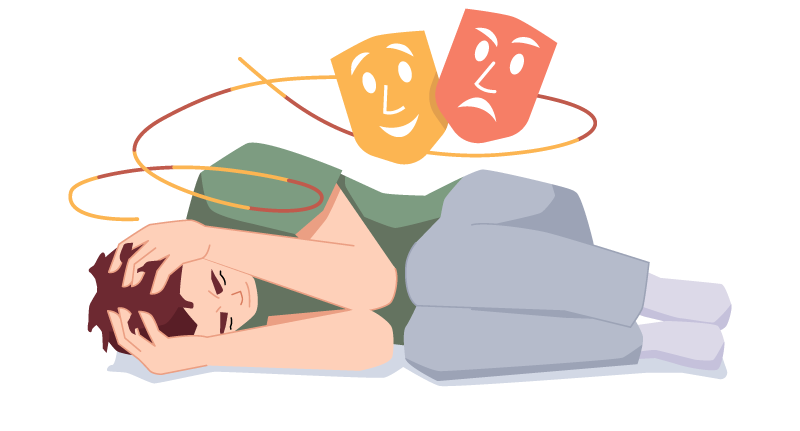Depression and Bipolar Disorder
A guide to manage depression and bipolar disorder—know your options
What is depression?
Depression is one of the most common mental health conditions experienced worldwide. It can be debilitating and interfere with many aspects of day-to-day functioning: school, work, self-care, and interpersonal relationships.
Depression typically presents as a consistently low mood and lack of pleasure in activities you typically enjoy. It also includes a mix of different symptoms:
- feeling more tired than usual
- sleeping more or less than usual
- eating more or less than usual
- feeling bad about yourself
- having difficulty concentrating
- having thoughts that you may be better off dead or hurting yourself
It is very important to speak with a healthcare provider if you are feeling this way.
Types of depression
It is critical to differentiate between the different forms of the mood disorder. While the symptoms of depression are similar for the various depressive conditions, the timeframe and timelines differ.
Major Depressive Disorder (MDD)
you experience a persistent low mood and disinterest in regular day-to-day activities. The low mood is severe and typically comes in episodes of at least two weeks. The episodes come and go, separated by periods of at least 2 months.
Persistent Depressive Disorder (PDD)
The symptoms are not as severe as MDD and do not come in waves. It is a persistent condition that exists at a low level at all times, for a period of at least 2 years.
Postpartum Depression (PPD)
is typically also diagnosed based on the time in which is is experienced. PPD is a period of depression that occurs after the birth of a new baby. It’s normal to feel a wide range of emotions after the birth of your child, but when this is a severely low mood and does not go away after a few weeks, it is often considered to be postpartum depression.
Seasonal Affected Disorder (SAD)
SAD is a form of depression that comes and goes based on the time of year and changing of the seasons. Fall-onset SAD is the most common and presents as decreased mood as the weather gets colder and it gets dark earlier in the day.
Different Types of Depression
Depression is one of the most commonly experienced mental illnesses worldwide. 1 in 5 people will experience some form of depression at some point in their lives, and some people even experience it chronically for most of their life. At its core, depression is characterized by a persistent feeling of sadness and hopelessness.
Treatment options
Depression can be managed by lifestyle changes, talk therapy, and/or medication management.
The lifestyle changes include eating a balanced diet, regular exercise, adequate sleep, managing stress, and maintaining your interpersonal relationships.
Talk therapy include IPT, which focuses on strengthening interpersonal relationships, as well as CBT, which focuses on recognizing thought patterns and changing resulting behaviours. Speak with your healthcare provider about which treatments are best for you.
Medications
There are five major classes of antidepressants, all of which have their differences; advantages and disadvantages. Learn more about the medications in each of these drug classes below:
- Selective Serotonin Reuptake Inhibitors (SSRIs): escitalopram, paroxetine, sertraline, citalopram, fluoxetine
- Serotonin Norepinephrine Reuptake Inhibitors (SNRIs): duloxetine, venlafaxine, desvenlafaxine
- Tricyclic antidepressants (TCAs): amitriptyline, nortriptyline
- Monoamine oxidase inhibitors (MAOIs): isocarboxazid, phenelzine
- Atypical antidepressants: mirtazapine, bupropion, trazadone
Antidepressants: types and side effects
Antidepressants are medications prescribed to treat a number of mental health conditions. The main mental health conditions that antidepressants are prescribed to treat are anxiety disorders and mood disorders.
What is bipolar disorder?

Bipolar disorder is another mood disorder but differs from depression in a number of ways.
Bipolar disorder is characterized by periods of extreme highs and/or lows in mood. The highs are classified as either “mania” or “hypomania”, and the lows are periods of depression.
Mania is described as a period with abnormally elevated mood, increased energy and activity, as well as the possible addition of psychotic symptoms (like disorganized speech and confused thinking), as well as a number of other possible symptoms. Hypomania is like a less intense and debilitating version of this, but without any psychotic symptoms.
Depressive episodes are typically similar to major depressive disorder. If you think you may be experiencing any of these symptoms, it is very important to speak with your healthcare provider as there are ways to help control the condition. For example, one of the main medications used to treat bipolar disorder is lithium.
The Highs and Lows of Bipolar Disorder
Bipolar disorder is a complex mood disorder that affects millions of people worldwide. Though it is not as widely discussed as other mental health issues, it’s very common and can greatly interfere with the lives of those with the condition. The mental health condition is characterized by episodes of mania and/or hypomania ("highs") and depression ("lows").